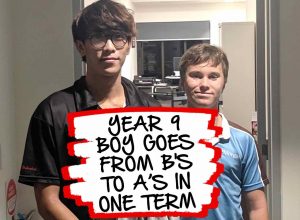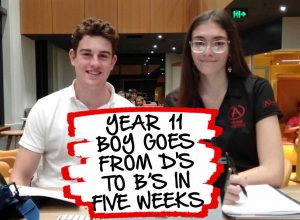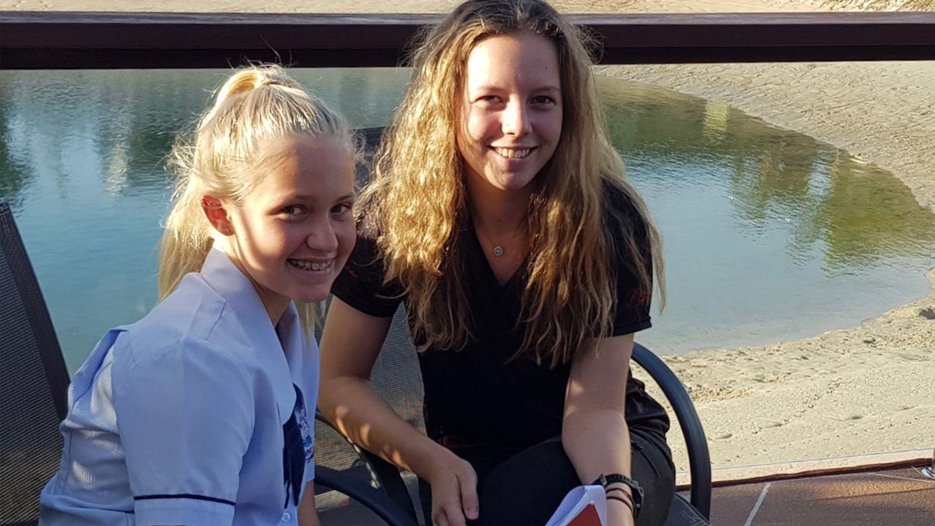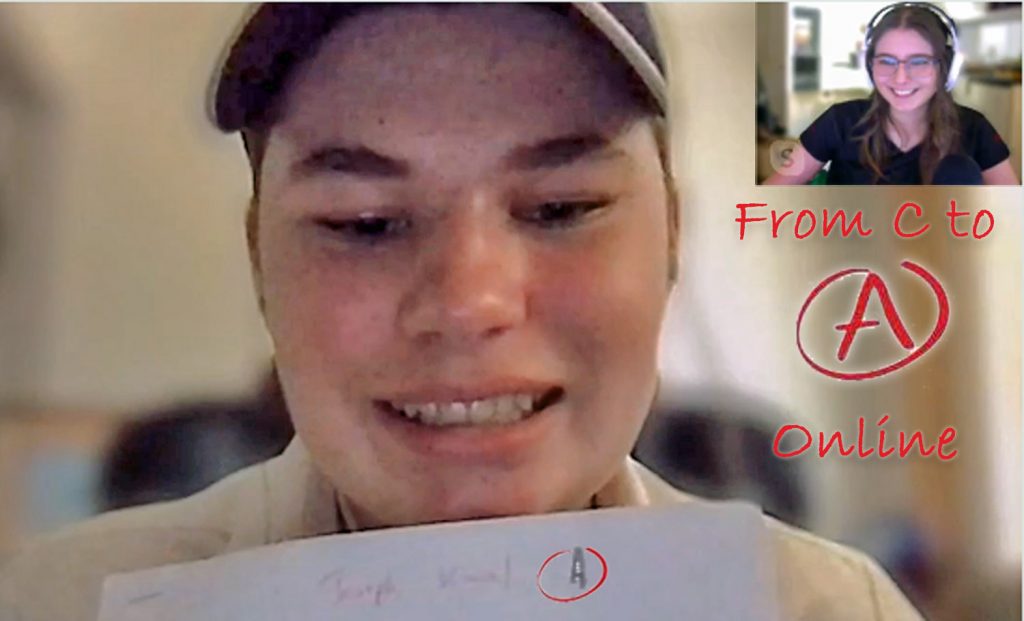Every single child we’ve worked with who is underperforming at school is underperforming for a reason. That reason surprised us. It’s not a lack of smarts. Let’s be clear. We have never met a child we couldn’t help to improve. Every child we’ve worked with has had the potential to reach greater academic heights. It’s not about extracurricular activities. It’s not about whether your school is less amazing than the next school. What makes a student underperform?
Every single student, out of thousands of students, had one thing holding them back: Mindset
That means that every single student underperforming at school has the potential to raise their grades. How can you tell if your child is underperforming at school? Do any of these scenarios sound familiar?
The Distracted/Unmotivated Mindset
Your teen sits down to start an assignment and then “bing” the phone notifies her of a TikTok she must watch. So you take her phone. And that goes down a treat. Then, you find her in her room, not studying, she’s going through drawers looking for something. So you sit her back at her desk. Finally, she even attempts to tidy her room as a procrastination tool. You don’t rush to stop her… because you know, you’re witnessing a miracle in front of your very eyes… but eventually, she MUST do the assignment. She’s distracting herself. Putting off work. It’s not that she’s lazy. Distraction is actually an issue of poor confidence. She’s trying to communicate that she’s so unsure of her work that she’d rather clean her room than attempt it.
How we change the “Distracted/Unmotivated” mindset
We get to the root of your child’s confidence issues and remove the barriers they’re facing. By creating more engaging lessons that help your child to break down the workload and to explore it on their terms, they find the confidence to take ownership of their work. This looks different for every child. For some kids, it’s about turning the workload into a game of sorts, where there is reward for discovering steps to tackle the subject matter. For others, it’s about a change of scene, where they are free to move around and take in some sunshine while they work. For some kids, it’s about improving their study strategy. It’s very, very rarely about closing them up in a dull room!
What does it mean in practice?
Ethan was a B student. Not bad. Doing OK. But his mother worried about his lack of motivation and she believed he wasn’t reaching his full potential. Tutor Brit took Ethan away from the standard desk set up and attacked his workload with beanbags and whiteboards. She let him lead the way in learning. She introduced fun and interactive ways for him to break down the workload – so he could focus on it, without distraction. Ethan is now an “A” student and the recipient of the coveted Principal’s Award.
Read Ethan’s Story
The “I Can’t Do It” Mindset
Your teen tells you, “I just don’t understand it. I can’t do it.” This quickly transforms into “It’s stupid, when will I even need this in the future?” Pretty soon, an underperforming student is a failing student because they feel that they’re just not bright enough to understand the curriculum. We see this a lot in students who are heavily skewed to either left or right brain learning. If your child thrives at Art and English, every maths exam feels like a big opportunity to fail.
How we change the “I Can’t Do It” mindset
Our tutors first address their learning language. The three primary learning languages dictate how well your student can take in different information. If your child is an aural learner, who retains information through reading and listening, a sheet of formulas can feel like an utter impossibility. So, our first step is to understand how your child learns and to translate the curriculum into the messages that their brain best receives and processes. Same information, different communication. Once your child can process the information in a familiar way, the “I can’t do it” mindset disappears. They can do it. And we can do it. Our tutors are trained to make a maths lesson feel like an English lesson. To make an English lesson echo a physics lesson.
What does it mean in practice?
Meet Ava. Ava went from a B- student to an A+ student in a month with our tutor’s help. It was that fast, and that simple. She merely needed her lessons transformed into the language that suited her needs.
Read Ava’s Story
The Overwhelm Mindset
Your child seems to take FOREVER to complete a simple assignment. They sit down to do their homework and it’s a struggle for all concerned. In the time it should take to get the first subject done, they still haven’t located a suitable pen. As a parent, words like lazy and disorganised start popping into mind, and you worry that your child will struggle with other life skills, like holding down a job. Deep breaths.
How we change the “Overwhelm” mindset
Every child is different, but our tutors would begin looking for clues as to the source of the child’s overwhelm. Most often it comes down to poor study strategy skills. We assume that by highschool, children have developed a set of skills that will carry them through their academic career but in a surprising number of students, this is not the case. Something as simple as looking at an assignment sheet and recognising the smaller tasks required to make up the bigger submission, to order these and to begin attacking them – this gap in your child’s understanding will cause underperformance in all areas of their school life. Our approach is to identify these gaps and help them to “relearn” how to study.
What does that look like in practice?
Joseph was a “C” student who was underperforming at school because he struggled with the “how” to study. It’s hard for a teacher in a busy classroom to pick apart a child’s underperformance and find the cause, so our tutor Emily took on that responsibility. Joseph, armed with an easy to follow study strategy, became an A student in no time.
Read Joseph’s Story
The Low Priority Mindset
What is the distraction your child is feeling is justified? What if there’s something big going on in her personal life or home life? How do you get a kid with a lot on her plate to keep focused on schoolwork? No child is beyond helping. We have worked with kids from all manner of backgrounds, including children who have endured terrible hardship and even trauma. When your world is chaotic, it’s hard to find mind space to dedicate to school work.
How we change the “Low Priority” mindset
We acknowledge the stress that the child is under and help them to find ways to work within the space that they have. It may mean finding a study strategy that helps them “do more with less time” or to give them the confidence boost they need to attack a task without hesitation and with complete focus. Our team is carefully trained to recognise challenges to learning. We empower children to take control of their studies and this in turn helps them feel more in control of their situations. Our program has been developed by child psychologists to ensure that no child, no matter how much chaos they work within, is left behind.
What does this look like in practice?
Meet Skylah. Skylah was an “E” student. For her teachers, Skylah represents the most challenging student in the class. She was simply unable to keep up. What our tutor Libbie discovered was that Skylah was coping with a sick mum. Not only did that mean she was carrying a heavy emotional load, it also meant that she was picking up the slack at home. She had very limited time for study and her grades were suffering. We helped her find ways to get more achieved in a very limited time. We helped her feel more “in control” of her life by helping her take charge of her studies. Skylah is now in the top 5% at school. She’s killing it. We could not be prouder of Skylah!
Read Skylah’s Story
And this is just the tip of the iceberg for underperforming at school
There are so many negative mindsets that end in your child underperforming at school. As parents, it’s almost impossible for you to diagnose and correct a problem with your teen’s mindset. Your child’s teacher will likely have made some progress, but nothing compares to intensive one-on-one diagnosis and correction. That’s where A Team Tuition has focused, with our “Academic Personal Training” program. All of our tutors are trained in overcoming barriers to learning and we’re proud of our many, many success stories. It’s not just these kids, we have hundreds of stories just like theirs. Your child could be one of them.
The post After 14000+ tutoring hours, we found the ONE thing all underperforming students have in common. appeared first on A Team Tuition.
from A Team Tuition https://ift.tt/31jMizw
via IFTTT








No comments:
Post a Comment